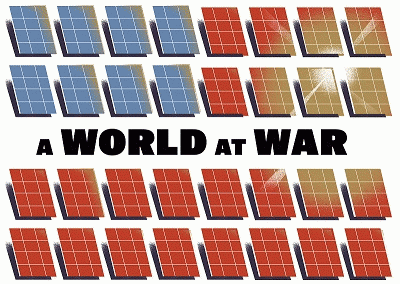Reprinted from New Republic
We're under attack from climate change -- and our only hope is to mobilize like we did in WWII.
In the North this summer, a devastating offensive is underway. Enemy forces have seized huge swaths of territory; with each passing week, another 22,000 square miles of Arctic ice disappears. Experts dispatched to the battlefield in July saw little cause for hope, especially since this siege is one of the oldest fronts in the war. "In 30 years, the area has shrunk approximately by half," said a scientist who examined the onslaught. "There doesn't seem anything able to stop this."
In the Pacific this spring, the enemy staged a daring breakout across thousands of miles of ocean, waging a full-scale assault on the region's coral reefs. In a matter of months, long stretches of formations like the Great Barrier Reef -- dating back past the start of human civilization and visible from space -- were reduced to white bone-yards.
Day after day, week after week, saboteurs behind our lines are unleashing a series of brilliant and overwhelming attacks. In the past few months alone, our foes have used a firestorm to force the total evacuation of a city of 90,000 in Canada, drought to ravage crops to the point where southern Africans are literally eating their seed corn, and floods to threaten the priceless repository of art in the Louvre. The enemy is even deploying biological weapons to spread psychological terror: The Zika virus, loaded like a bomb into a growing army of mosquitoes, has shrunk the heads of newborn babies across an entire continent; panicked health ministers in seven countries are now urging women not to get pregnant. And as in all conflicts, millions of refugees are fleeing the horrors of war, their numbers swelling daily as they're forced to abandon their homes to escape famine and desolation and disease.
World War III is well and truly underway. And we are losing. For years, our leaders chose to ignore the warnings of our best scientists and top military strategists. Global warming, they told us, was beginning a stealth campaign that would lay waste to vast stretches of the planet, uprooting and killing millions of innocent civilians. But instead of paying heed and taking obvious precautions, we chose to strengthen the enemy with our endless combustion; a billion explosions of a billion pistons inside a billion cylinders have fueled a global threat as lethal as the mushroom-shaped nuclear explosions we long feared. Carbon and methane now represent the deadliest enemy of all time, the first force fully capable of harrying, scattering, and impoverishing our entire civilization.
We're used to war as metaphor: the war on poverty, the war on drugs, the war on cancer. Usually this is just a rhetorical device, a way of saying, "We need to focus our attention and marshal our forces to fix something we don't like." But this is no metaphor. By most of the ways we measure wars, climate change is the real deal: Carbon and methane are seizing physical territory, sowing havoc and panic, racking up casualties, and even destabilizing governments. (Over the past few years, record-setting droughts have helped undermine the brutal strongman of Syria and fuel the rise of Boko Haram in Nigeria.) It's not that global warming is like a world war. It is a world war. Its first victims, ironically, are those who have done the least to cause the crisis. But it's a world war aimed at us all. And if we lose, we will be as decimated and helpless as the losers in every conflict -- except that this time, there will be no winners, and no end to the planet-wide occupation that follows.
The question is not, are we in a world war? The question is, will we fight back? And if we do, can we actually defeat an enemy as powerful and inexorable as the laws of physics?
To answer those questions -- to assess, honestly and objectively, our odds of victory in this new world war -- we must look to the last one.
For four years, the United States was focused on a single, all-consuming goal, to the exclusion of any other concern: defeating the global threat posed by Germany, Italy, and Japan. Unlike Adolf Hitler, the last force to pose a planet-wide threat to civilization, our enemy today is neither sentient nor evil. But before the outbreak of World War II, the world's leaders committed precisely the same mistake we are making today -- they tried first to ignore their foe, and then to appease him.
Eager to sidestep the conflict, England initially treated the Nazis as rational actors, assuming that they would play by the existing rules of the game. That's why Neville Chamberlain came home from Munich to cheering crowds: Constrained by Britain's military weakness and imperial overreach, he did what he thought necessary to satisfy Hitler. Surely, the thinking went, the dictator would now see reason.
But Hitler was playing by his own set of rules, which meant he had contempt for the political "realism" of other leaders. (Indeed, it meant their realism wasn't.) Carbon and methane, by contrast, offer not contempt but complete indifference: They couldn't care less about our insatiable desires as consumers, or the sunk cost of our fossil fuel infrastructure, or the geostrategic location of the petro-states, or any of the host of excuses that have so far constrained our response to global warming. The world came back from signing the climate accord in Paris last December exactly as Chamberlain returned from Munich: hopeful, even exhilarated, that a major threat had finally been tackled. Paul Krugman, summing up the world's conventional wisdom, post-Paris, concluded that climate change "can be avoided with fairly modest, politically feasible steps. You may want a revolution, but we don't need one to save the planet." All it would take, he insisted, is for America to implement Obama's plan for clean power, and to continue "guiding the world as a whole toward sharp reductions in emissions," as it had in Paris.
This is, simply put, as wrong as Chamberlain's "peace in our time." Even if every nation in the world complies with the Paris Agreement, the world will heat up by as much as 3.5 degrees Celsius by 2100 -- not the 1.5 to 2 degrees promised in the pact's preamble. And it may be too late already to meet that stated target: We actually flirted with that 1.5 degree line at the height of the El Ni????o warming in February, a mere 60 days after the world's governments solemnly pledged their best efforts to slow global warming. Our leaders have been anticipating what French strategists in World War II called the guerre du longue duree, even as each new edition of Science or Nature makes clear that climate change is mounting an all-out blitzkrieg, setting new record highs for global temperatures in each of the past 14 months.
Not long after Paris, earth scientists announced that the West Antarctic ice sheet is nowhere near as stable as we had hoped; if we keep pouring greenhouse gases into the atmosphere, it will shed ice much faster than previous research had predicted. At an insurance industry conference in April, a federal official described the new data as "an OMG thing." "The long-term effect," The New York Times reported, "would likely be to drown the world's coastlines, including many of its great cities." If Nazis were the ones threatening destruction on such a global scale today, America and its allies would already be mobilizing for a full-scale war.
(Note: You can view every article as one long page if you sign up as an Advocate Member, or higher).







